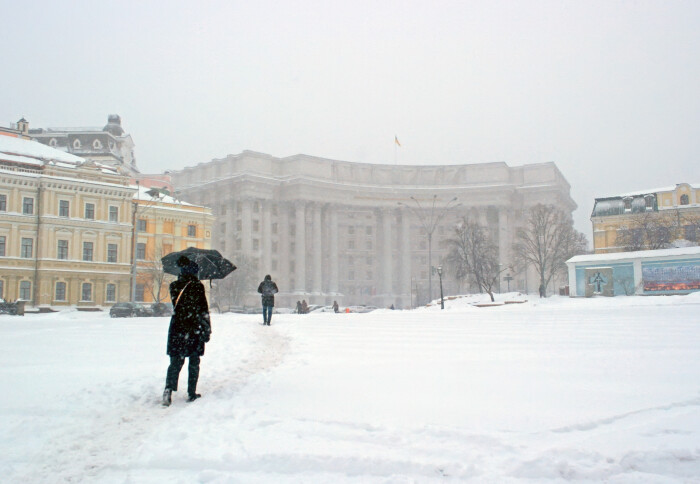Climate change increased rain and snow from Storm Bettina in Ukraine and Russia

Climate change made the heavy rain and snowfall that hit Ukraine and Russia in November twice as likely, a study has found.
On November 28, Storm Bettina made landfall in Eastern Europe, just days before the start of COP28, the annual UN climate change conference.
The storm brought heavy snowfall to Moldova, Bulgaria, Romania and Ukraine, and severe rainfall across Crimea, eastern Ukraine and Türkiye.
On the Black Sea, hurricane-force winds of up to 120 km/h drove powerful waves that damaged Russian coastal defence lines and the Crimean Bridge.
The study, published today by World Weather Attribution, found that human-caused climate change increased the intensity and likelihood of the rain and snowfall, but not the strong winds.
Dr Mariam Zachariah, Research Associate, Grantham Institute – Climate Change and the Environment at Imperial College London and one of the authors of the study, said:
“Our findings are in line with previous analyses, showing that the frequency of heavy rain and snow storms around the Black Sea is increasing with climate change.
The study also found that if warming reaches 2°C, rain and snow from winter storms in Eastern Europe will become even more intense.
Human-caused climate change is fuelling extreme weather around the world.
World Weather Attribution has now published more than 60 studies investigating the influence of climate change on weather disasters, including a study last week that found that the devastating Amazon rainforest drought last year was made 30 times more likely by climate change.

War worsened the impacts of Storm Bettina
According to the researchers, Russia’s invasion of Ukraine made many communities much more vulnerable to the impacts of the storm.
Julie Arrighi, Director at the Red Cross Red Crescent Climate Centre and one of the authors of the study, said:
“Climate change doesn’t stop during times of conflict.
“War stretches the resources and ability of countries to respond to disasters like severe storms.”
At least 23 people died, most in Ukraine, while more than 2.5 million people were affected by power outages, damages to infrastructure and transport disruptions.
In Ukraine, urban centres have been significantly affected by the war and more vulnerable to extreme weather as a result.
The conflict has damaged critical infrastructure for water supply, sanitation, and waste management in cities and towns.
“Until the world stops burning fossil fuels, weather extremes around the world will continue to intensify, making the world more unstable and more dangerous.” Friederike Otto, Senior Lecturer in Climate Science at the Grantham Institute - Climate Change and the Environment
The World Bank has estimated that the cost of clearing the debris from the conflict alone to be approximately $5 billion.
Friederike Otto, Senior Lecturer in Climate Science at the Grantham Institute - Climate Change and the Environment, Imperial College London and the lead of World Weather Attribution said:
“Hundreds of thousands of Ukrainians have been displaced by the war and continue to suffer from damage to civilian energy infrastructure in winter, leading to wide ranging impacts on a vulnerable population.
“Recent World Weather Attribution studies on extreme weather events in the Horn of Africa, West Asia and Libya all found that war greatly decreased the ability of people to respond in the aftermath of disaster.
“Until the world stops burning fossil fuels, weather extremes around the world will continue to intensify, making the world more unstable and more dangerous.”
-
‘Climate change increased heavy precipitation associated with impactful Storm Bettina over Black Sea’ is published at World Weather Attribution.
Article supporters
Article text (excluding photos or graphics) © Imperial College London.
Photos and graphics subject to third party copyright used with permission or © Imperial College London.
Reporter
Jamie Taylor
The Grantham Institute for Climate Change
Sam Ezra Fraser-Baxter
The Grantham Institute for Climate Change